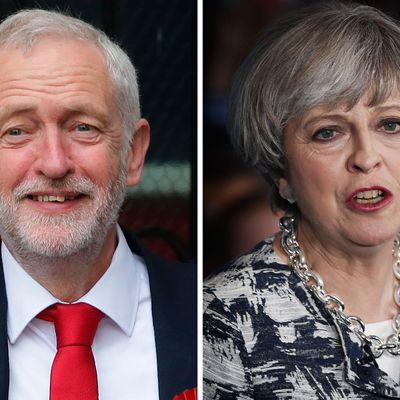
In a considerable surprise (although polls were more than a little erratic and have a recent record of inaccuracy), the semi-official exit poll of British voters released just as the polls closed Thursday showed the governing Conservative Party losing its slim majority in the House of Commons. If the results hold up, Britain would be entering a period of profound uncertainty when either of the two big parties could, in theory, form a coalition government (the situation is generally referred to as a “hung parliament”).
Votes were still being counted at 4 a.m. local time, but the Washington Post reported that a projection based on the exit poll and partial official results gave Prime Minister Theresa May’s Conservative (a.k.a Tory) party 318 seats, eight short of a majority. Two years ago, Conservatives won 331 seats. The forecast showed the Labour Party winning 267 seats, which would be a gain of roughly 35 seats.
The exit poll is hardly infallible, but has been increasingly accurate in recent general elections. It nailed the seat totals in 2005 and 2010, though it did underestimate Tory seats by 22 in 2015.
Given the consensus expectation of a huge Tory victory in the popular vote, and of at least modest gains in the government’s parliamentary majority, the exit poll and early results were a nasty shock to the conventional wisdom (currency markets are already showing a drop in the value of the pound). They confirm the folly of May’s request for a “snap election” aimed at giving her a stronger hand in Brexit negotiations, and perhaps provoking a big split within Labour, where Jeremy Corbyn has been a controversial left-wing leader without a lot of support among his own MPs.
It should be emphasized that the exit poll results would still leave the Conservatives as the largest party (with 314 seats to Labour’s 266), presumably giving it first shot at forming a coalition government. If the Tories get close to the 326 needed for a majority, they might get over the line with support from Northern Ireland parties that won’t make too many demands for their votes. Another option would be a renewal of David Cameron’s coalition with the Liberal Democrats, though (1) that coalition nearly destroyed the LibDems, and (2) that party is fully committed to a second Brexit referendum seeking to reverse last year’s results — which would be highly problematic for many pro-Brexit Tory backbenchers and voters.
Labour’s narrow path to power would almost certainly involve a coalition with the Scottish National Party and smaller Welsh and left-wing parties. On many domestic issues the SNP is close to, or even to the left of, Labour. But Corbyn would almost definitely have to grant the SNP a second shot an independence vote, which will be controversial in England.
There’s also the possibility of a minority Tory government (one with the votes to overcome a motion of “no confidence,” but without minor parties formally joining a coalition) or even an agreement to hold a second election.
All these scenarios will depend on the exact seat count, as individual constituencies report (there are many the exit poll shows as very close). However it turns out, the election represents a real vindication for Corbyn, who did not turn out to be the electioneering disaster many even in his own party expected, and a big setback for May, who was cruising along until her party embraced a sort of post-death clawback system for recouping public money spent on old folks living at home, known colloquially as the “dementia tax.”
It is also clear that the widespread conventional wisdom that terrorist attacks invariably benefit parties of the right was not true in this case. That bit of information will be internalized in many, many places. And Corbyn also struck a blow against the common assumption that parties must “move to the center” to win.
Beyond that, the meaning of this election will await further events.






























